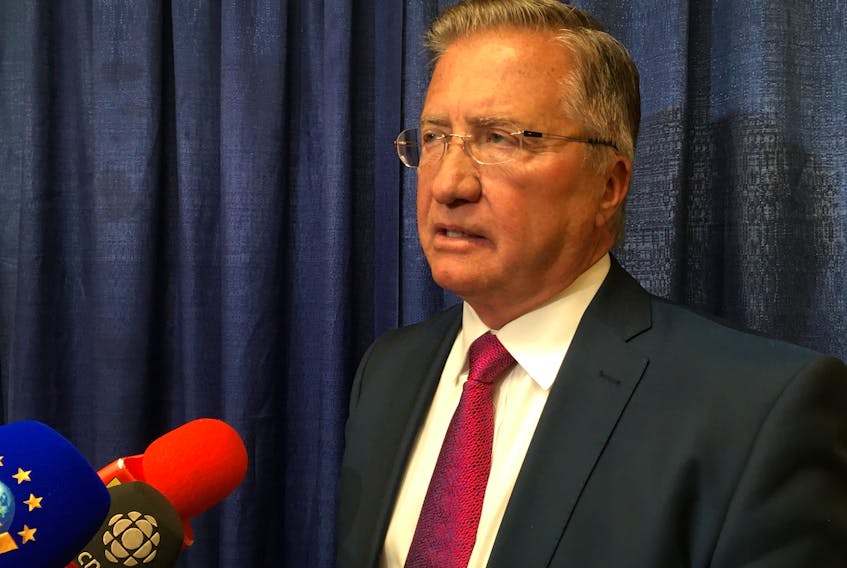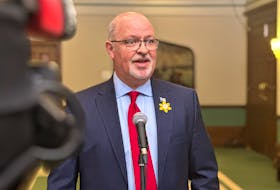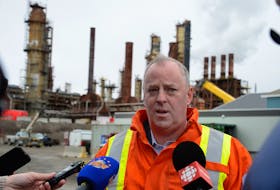The cost of the Muskrat Falls hydroelectric project is set to fall to the shoulders of local ratepayers, but under cross-examination at the inquiry into the project, former premier Danny Williams said Tuesday there is some “short-term pain” in an expected rise in power rates, but he asked people not to panic.
He said the province has options for limiting the rise in electricity rates.
“It’s alright for me to say be patient, but on the other hand the government has to come up with solutions (on rates), and they will, because they’re there,” he testified.
Williams was being asked about Muskrat Falls project costs. He said the idea was always to use revenue from non-renewable resources, namely offshore oil projects, to develop renewable resource assets, including Muskrat Falls hydroelectric power.
RELATED STORIES:
Critics not convinced after Williams’ testimony
Muskrat Falls inquiry — from 'unacceptable’ PUB to methylmercury
“You’ve got to have a look at this (Muskrat Falls) project in the big picture and you’ve got to have a look at it in our energy picture, and you’ve got to tie it into the Upper Churchill down the road and how this all comes together at some point,” he said, pointing to the 2007 provincial energy plan and the “energy warehouse” as still a vision for the province.
Representing the Concerned Citizens Coalition, lawyer Geoff Budden challenged Williams on the costs of Muskrat Falls, asking at what estimated cost the former premier would have considered the project uneconomical.
Williams didn’t have a serious number on that.
The project has moved from a very early $5-billion capital cost estimate, when Williams was establishing non-binding agreements to further explore the development, to a $10.1-billion estimate today ($12.7 billion including financing costs).
“(But) if someone put a value on Muskrat Falls in 20 years’ time, I would suggest to you it would be a lot more than $10.1 billion,” he said, promoting the long view.
Nalcor oversight
The day at the inquiry included more questions on what Williams understood to be the risks. He spoke about passing the environmental review process and other steps toward development, as well as the capabilities within Nalcor Energy to determine costs and risk. He mentioned review at the deputy ministerial level, particularly in Finance.
“I know you’re giving your evidence based on everything you know, but based on what we have found in our investigation, it appears that government simply accepted the review and work and cost estimates provided by Nalcor up to Decision Gate 2 … without any analysis or review,” said inquiry co-counsel Barry Learmonth, explaining he was referring up to time of Williams’ departure in late 2010.
Williams said that just wasn’t the case. And he said he expects future witnesses could address the question of government review further.
Commissioner Richard LeBlanc followed up, saying there is a search on for any detailed look early on within government, considering any potential ramifications to the province’s fiscal position.
“It is a bit surprising to us we haven’t seen that,” LeBlanc said, with a caveat the commission is still working through available evidence. “We’re still looking and we are basically questioning people about it. But I gather from what you said, you would be surprised if that was not done.”
Williams said he would be.
A lead member of the Concerned Citizens Coalition, Des Sullivan, said it is an important line of thinking. “It would appear that whatever Nalcor deigned necessary or whatever it said shot up through a funnel, almost directly to cabinet, without any screening by government officials,” he told The Telegram, adding any use of oil money to keep rates in check was also not part of the public pitch.
Sullivan’s fellow coalition member, David Vardy, said you would expect a multibillion-dollar public investment to be heavily scrutinized, whether involving a private corporation or a Crown corporation.
After the proceedings, Williams was asked again about oversight. He said that up to his departure, Nalcor Energy was reporting in on a daily basis, there are plenty of briefing notes in evidence to show bureaucrat involvement, and he was comfortable with the project’s review.









